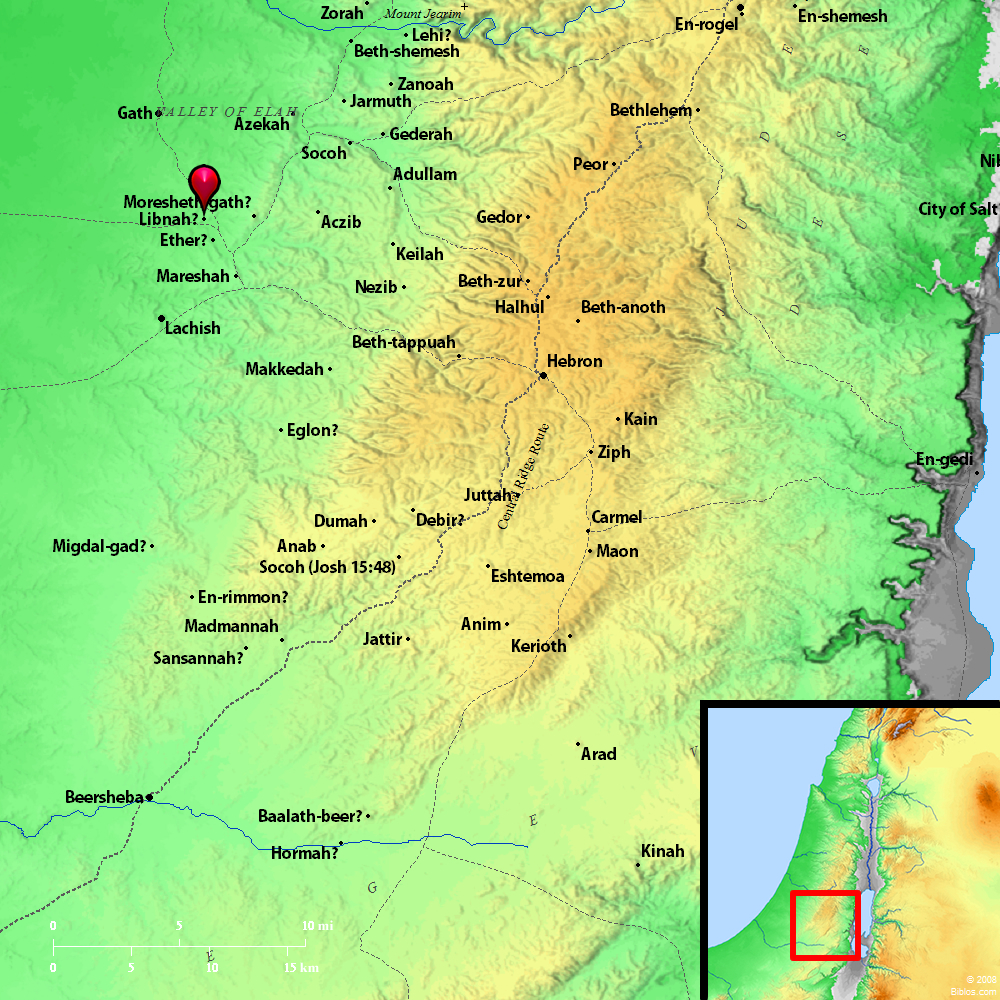Atlas  Libnah and surrounding region Maps Created using Biblemapper 3.0 Additional data from OpenBible.info Occurrences Joshua 10:29 Joshua passed from Makkedah, and all Israel with him, to Libnah, and fought against Libnah.Joshua 10:30 Yahweh delivered it also, with its king, into the hand of Israel. He struck it with the edge of the sword, and all the souls who were in it. He left none remaining in it. He did to its king as he had done to the king of Jericho. Joshua 10:31 Joshua passed from Libnah, and all Israel with him, to Lachish, and encamped against it, and fought against it. Joshua 10:32 Yahweh delivered Lachish into the hand of Israel. He took it on the second day, and struck it with the edge of the sword, with all the souls who were in it, according to all that he had done to Libnah. Joshua 10:39 He took it, with its king and all its cities. They struck them with the edge of the sword, and utterly destroyed all the souls who were in it. He left none remaining. As he had done to Hebron, so he did to Debir, and to its king; as he had done also to Libnah, and to its king. Joshua 12:15 the king of Libnah, one; the king of Adullam, one; Joshua 15:42 Libnah, Ether, Ashan, Joshua 21:13 To the children of Aaron the priest they gave Hebron with its suburbs, the city of refuge for the manslayer, Libnah with its suburbs, 2 Kings 8:22 So Edom revolted from under the hand of Judah to this day. Then did Libnah revolt at the same time. 2 Kings 19:8 So Rabshakeh returned, and found the king of Assyria warring against Libnah; for he had heard that he had departed from Lachish. 2 Kings 23:31 Jehoahaz was twenty-three years old when he began to reign; and he reigned three months in Jerusalem: and his mother's name was Hamutal the daughter of Jeremiah of Libnah. 2 Kings 24:18 Zedekiah was twenty-one years old when he began to reign; and he reigned eleven years in Jerusalem: and his mother's name was Hamutal the daughter of Jeremiah of Libnah. 1 Chronicles 6:57 To the sons of Aaron they gave the cities of refuge, Hebron; Libnah also with its suburbs, and Jattir, and Eshtemoa with its suburbs, 2 Chronicles 21:10 So Edom revolted from under the hand of Judah to this day: then did Libnah revolt at the same time from under his hand, because he had forsaken Yahweh, the God of his fathers. Isaiah 37:8 So Rabshakeh returned, and found the king of Assyria warring against Libnah, for he had heard that he was departed from Lachish. Jeremiah 52:1 Zedekiah was twenty-one years old when he began to reign; and he reigned eleven years in Jerusalem: and his mother's name was Hamutal the daughter of Jeremiah of Libnah. Encyclopedia LIBNAHlib'-na (libhnah "whiteness," "transparency," "pavement" (compare Exodus 24:10 where libhnath, is translated "paved work" or a "compact foundation"); Lebna): Strong's Hebrew H3841: Libnaha city in S.W. Judah, also a place in the wilderness |



